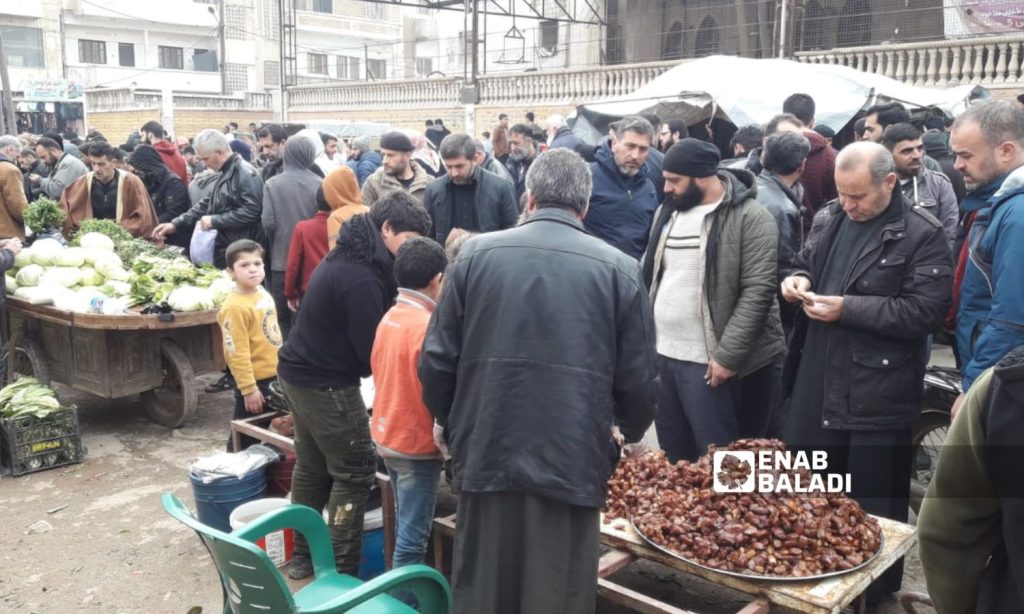Enab Baladi – Anas al-Khouli
Dozens of people gather every week after the end of Friday prayer, heading to the small markets that the owners of stalls and stands prepare in front of the mosques in the northern city of Idlib, taking advantage of the absence of city council patrols that prevent their work.
Ahmed al-Abdullah, 30, takes advantage of Fridays to make use of the crowding in front of mosques and the absence of municipal patrols to set up his stand and display his goods in the hope of getting a better income.
Al-Abdullah is a delivery worker on a motorbike, but his limited income prompted him to lay out a stand of vegetables and fruits every Friday near the al-Hussein mosque.
The phenomenon of random stalls has spread widely in Idlib over the past years until the city council of the Ministry of Local Administration and Services of the Syrian Salvation Government (SSG) issued, on 10 May 2022, a decision to remove kits and kiosks from the streets and sidewalks, in order to ensure the traffic movement of citizens and cars.
Source of income
Stalls and stands are a source of livelihood for many Idlib residents who are unable to find job opportunities or who are looking for additional income in light of low wages and high prices.
The forty-something-year-old, Amin Qusra, relied on his stand to sell vegetables to earn his living since he arrived in Idlib, escaping from the security pursuits in the regime-held areas.
After the decision to ban stalls, Qusra’s income was limited to what he earns from selling on Fridays, according to what he told Enab Baladi.
Paying the rent for a shop in the market that the city council allocated for selling vegetables exceeds his ability and is not commensurate with the profit he can make from selling in the market, he added.
The market is also far from the city center, which makes it difficult for sellers and customers to reach it, and limits sales, according to Qusra.
Sellers face many difficulties, especially in light of the low temperatures and rainfall and the pursuit of municipal patrols that confiscate goods.
Ahmad al-Sayyid Youssef, 60, told Enab Baladi, in front of his vegetable store near a mosque, that many vegetable sellers in the market set up stalls in front of mosques on Fridays due to the decline in sales and the lack of shopping.
Inconvenience, obstruction of movement
The squares in front of the doors of the mosques are crowded with customers and owners of stalls whose voices are loud.
Abdullah al-Ali, 32, complained about the shouts of the vendors, as each of them starts chanting phrases that draw attention to his merchandise in a loud voice, ignoring the impact of this on worshipers and residents of neighboring houses, according to what the young man told Enab Baladi.
Omar al-Saeed, 51, also criticized the phenomenon of stalls at the doors of mosques as a cause of inconvenience to worshipers.
Al-Saeed said the stalls close the doors of mosques, and cause the roads near them to be closed, which impedes the arrival of worshipers to the mosque.
The voices of the sellers disturb the owners of the houses near the mosque, as the twenty-year-old Muhammad Samir, who lives near the Abu Dharr mosque, said that the presence and voices of the sellers are a source of disturbance to the residents, in addition to the fact that their stands cause the closure of the main street near the mosque.
“Unsatisfactory” solutions
Firas Alloush, the Public Relations Officer in the Idlib City Council, told Enab Baladi that the stalls in front of some mosques impede traffic in front of cars and motorcycles, which prompts the council, in cooperation with the competent authorities, to work to remove these stands and move them to another location, like the “Kastana” market.
The local council has activated a number of alternative markets for random stalls in the city, and many vendors have moved to it, according to Alloush.
The decision to ban stalls and stands and work to move them to designated markets since May 2022 angered their owners, who criticized the distance of the markets designated for them from the city and the weak sales movement at a time of exacerbating humanitarian crises in Syria.
According to estimates by the UN Office for the Coordination of Humanitarian Affairs (OCHA), the number of people in need of humanitarian assistance in northwestern Syria during the year 2022 reached about four million and 600,000 people, including three million and 300,000 suffering from food insecurity, and two million and 900,000 internally displaced persons.
The number of people in need of humanitarian assistance rose to 14.6 million, an increase of 1.2 million people compared to last year, and this figure is expected to reach 15.3 million people in 2023.











